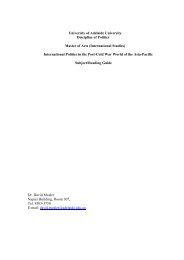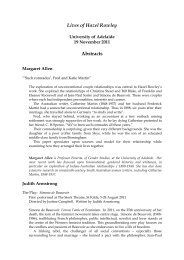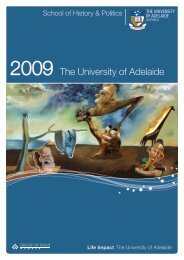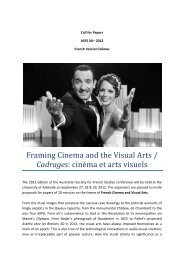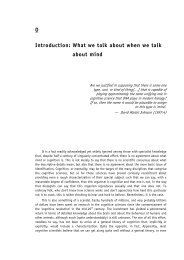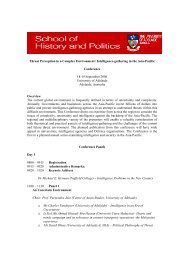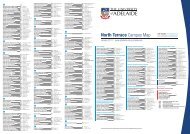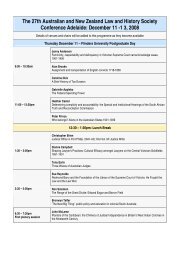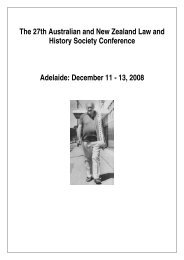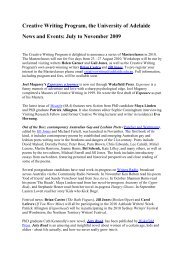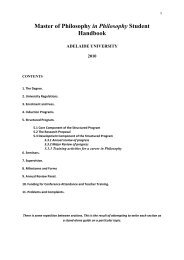Biohumanities - Paul Griffiths - Representing Genes
Biohumanities - Paul Griffiths - Representing Genes
Biohumanities - Paul Griffiths - Representing Genes
You also want an ePaper? Increase the reach of your titles
YUMPU automatically turns print PDFs into web optimized ePapers that Google loves.
March 2008 “SCI-PHI” SYMPOSIUM<br />
45<br />
317–348 in The Concept of the Gene in Development<br />
and Evolution, edited by P Beurton et al. Cambridge<br />
(UK): Cambridge University Press.<br />
Feyerabend P. 1975. Against Method. London (UK): Verso.<br />
Gerstein M B, Bruce C, Rozowsky J S, Zheng D, Du J,<br />
Korbel J O, Emanuelsson O, Zhang Z D, Weissman<br />
S, Snyder M. 2007. What is a gene, post-<br />
ENCODE? history and updated definition. Genome<br />
Research 17:669–681.<br />
Gilbert S F. 2000. <strong>Genes</strong> classical and genes developmental:<br />
the different uses of genes in evolutionary<br />
syntheses. Pages 178–192 in The Concept of the Gene in<br />
Development and Evolution, edited by P Beurton et al.<br />
Cambridge (UK): Cambridge University Press.<br />
Gilbert S F. 2003. Evo-devo, devo-evo, and devgenpopgen.<br />
Biology and Philosophy 18:347–352.<br />
<strong>Griffiths</strong> P E. 2002. What is innateness? The Monist<br />
85:70–85.<br />
<strong>Griffiths</strong> P E, Stotz K. 2006. <strong>Genes</strong> in the postgenomic<br />
era. Theoretical Medicine and Bioethics 27:499–521.<br />
<strong>Griffiths</strong> P E, Stotz K. 2007. Gene. Pages 85–102 in<br />
Cambridge Companion for the Philosophy of Biology,<br />
edited by D Hull and M Ruse. Cambridge (UK):<br />
Cambridge University Press.<br />
Jablonka E, Lamb M J. 2005. Evolution in Four Dimensions:<br />
Genetic, Epigenetic, Behavioral, and Symbolic Variation in the<br />
History of Life. Cambridge (MA): MIT Press.<br />
Kay L E. 2000. Who Wrote the Book of Life: A History of the<br />
Genetic Code. Palo Alto (CA): Stanford University Press.<br />
Keller E F. 1995. Refiguring Life: Metaphors of Twentieth<br />
Century Biology. New York: Columbia University Press.<br />
Kitcher P. 1984. 1953 and all that: a tale of two sciences.<br />
Philosophical Review 93:335–373.<br />
Mameli M, Bateson P P G. 2006. Innateness and the<br />
sciences. Biology and Philosophy 22:155–188.<br />
Mattick J S. 2004. RNA regulation: a new genetics?<br />
Nature Reviews Genetics 5:316–23.<br />
Meaney M J. 2004. The nature of nurture: maternal<br />
effect and chromatin modeling. Pages 1–14 in<br />
Essays in Social Neuroscience, edited by J T Cacioppo<br />
and G G Berntson. Cambridge (MA): MIT Press.<br />
Moss L. 2003. What <strong>Genes</strong> Can’t Do. Cambridge (MA):<br />
MIT Press.<br />
Moss L. 2006. The question of questions: what is a<br />
gene? comments on Rolston and <strong>Griffiths</strong> & Stotz.<br />
Theoretical Medicine and Bioethics 27:523–534.<br />
Mousseau T A, Fox C W. 2003. Maternal Effects as<br />
Adaptations. Oxford (UK) and New York: Oxford<br />
University Press.<br />
Nijhout H F. 1990. Metaphors and the role of genes<br />
in development. BioEssays 12(9):441–446.<br />
Olby R C. 1974. The Path to the Double Helix. Seattle<br />
(WA): University of Washington Press.<br />
Olby R C. 1985. The Origins of Mendelism. Second Edition.<br />
Chicago (IL): University of Chicago Press.<br />
Pigliucci M. 2001. Phenotypic Plasticity: Beyond Nature<br />
and Nurture. Baltimore (MD): Johns Hopkins University<br />
Press.<br />
Pigliucci M, Kaplan J. 2006. Making Sense of Evolution:<br />
The Conceptual Foundations of Evolutionary Biology.<br />
London (UK) and Chicago (IL): University of<br />
Chicago Press.<br />
Samuels R. 2002. Innateness. Mind and Language 17:<br />
233–265.<br />
Schlichting C D, Pigliucci M. 1998. Phenotypic Evolution: A<br />
Reaction Norm Perspective. Sunderland (MA): Sinauer.<br />
Sober E, Wilson D S. 1998. Unto Others: The Evolution<br />
and Psychology of Unselfish Behavior. Cambridge<br />
(MA): Harvard University Press.<br />
Sterelny K, <strong>Griffiths</strong> P E. 1999. Sex and Death: An<br />
Introduction to the Philosophy of Biology. Chicago<br />
(IL): University of Chicago Press.<br />
Stotz K. 2006a. Molecular epigenesis: distributed<br />
specificity as a break in the Central Dogma. History<br />
and Philosophy of the Life Sciences 28(3–4):527–544.<br />
Stotz K. 2006b. With genes like that, who needs an<br />
environment? postgenomics’ argument for the<br />
ontogeny of information. Philosophy of Science 73:<br />
905–917.<br />
Stotz K, Bostanci A, <strong>Griffiths</strong> P E. 2006. Tracking the shift<br />
to “post-genomics.” Community Genetics 9:190–196.<br />
Stotz K, <strong>Griffiths</strong> P E. 2004. <strong>Genes</strong>: philosophical analyses<br />
put to the test. History and Philosophy of the Life<br />
Sciences. 26:5–28.<br />
Stotz K, <strong>Griffiths</strong> P E, Knight R D. 2004. How scientists<br />
conceptualize genes: an empirical study. Studies in<br />
History and Philosophy of Biological and Biomedical<br />
Sciences 35:647–673.<br />
Turney J. 2005. The sociable gene. EMBO Reports<br />
6:809–810.<br />
Waddington C H. 1952. The evolution of developmental<br />
systems. Pages 155–159 in Twenty-Eighth<br />
Meeting of the Australian and New Zealand Association<br />
for the Advancement of Science, edited by D A Herbert<br />
and A H Tucker. Brisbane (Australia): Government<br />
Printer Brisbane.<br />
Waters C K. 1994. <strong>Genes</strong> made molecular. Philosophy<br />
of Science 61:163–185.<br />
Waters C K. 2004. What concept analysis should be<br />
(and why competing philosophical analyses of<br />
gene concepts cannot be tested by polling scientists).<br />
Studies in History and Philosophy of the Life<br />
Sciences 26:29–58.<br />
West M J, King A P. 1987. Settling nature and nurture<br />
into an ontogenetic niche. Developmental Psychobiology<br />
20:549–562.<br />
West-Eberhard M J. 2003. Developmental Plasticity and<br />
Evolution. Oxford (UK) and New York: Oxford<br />
University Press.<br />
Wilkins J. 2006. Philosophers Are to Science, as Ornithologists<br />
Are to Birds. http://scienceblogs<br />
.com/evolvingthoughts/2007/06/philosophy_is<br />
_to_science_as_or.php.



